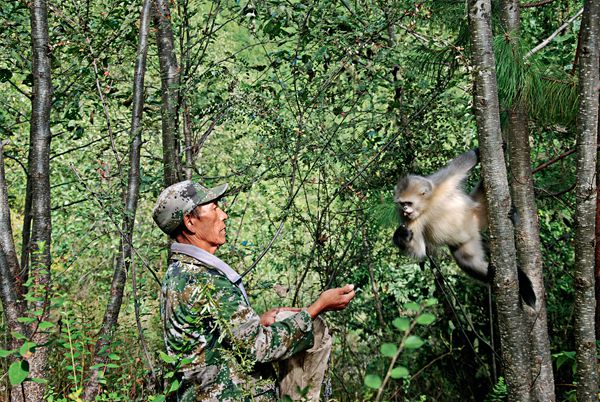A Life Devoted to Protecting the Snub-nosed Monkey
China Today, February 7, 2017 Adjust font size:
From Hunter to Ranger
The habitat of the Yunnan snub-nosed monkey is at a relatively high elevation. In China, they command national protection, and to Yu, they are like family members. According to Yu’s observations, the Yunnan snub-nosed monkey also treats its family – a polygamous patriarchal system – as a basic social unit. Around nine families of a total 50 monkeys live in the national park. The rangers have given them such names as “big body,” “red face,” and “broken hand,” according to their physical features.
|
Yu Jianhua’s work over the past 20 years has been to protect the Yunnan snub-nosed monkey. Dixuan |
Every morning at around five o’clock, Yu, dressed in camouflage suit and rubber boots, sets out for the mountain taking with him the monkeys’ favorite foods. Despite carrying a dozen kilos or more, Yu maintains a swift pace. “At times when I’ve had lots of walking to do I’ve worn out a pair of shoes in just one week,” Yu said. In the old days of frugal living, his wife complained a lot about that.
It’s hard to imagine that this ranger, so dedicated to protecting the Yunnan snub-nosed monkey, was once a well-known hunter in the village, and lived by both farming and hunting. “But we never hunted monkeys. They are our ancestors,” Yu said. When he heard around 20 years ago that the government was going to protect the snub-nosed monkey, he immediately registered as a ranger. Earning a daily six-yuan subsidy and supplied with a pair of worn-out shoes, Yu had no complaints about his work. But he had to give up smoking because, “I couldn’t afford it any more.” Gradually an emotional bond formed between him and the monkeys. His monthly 180-yuan subsidy remained unchanged for 12 years.
